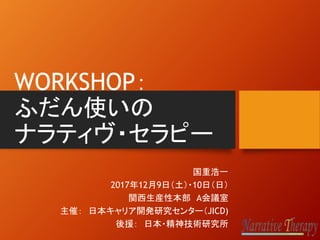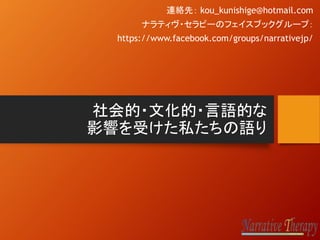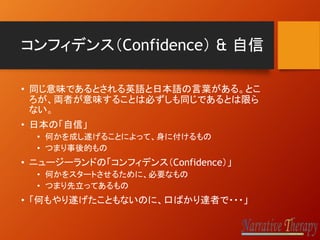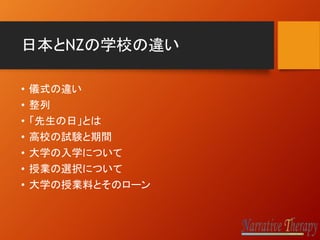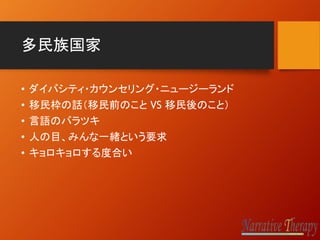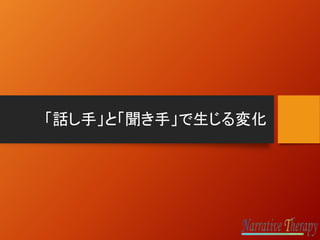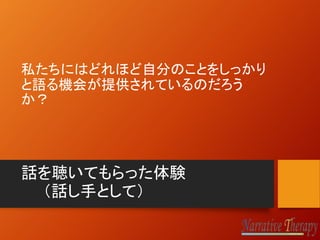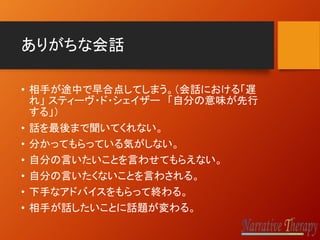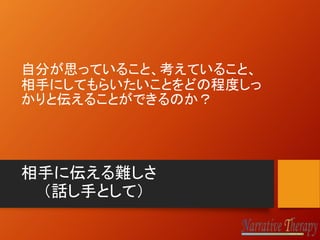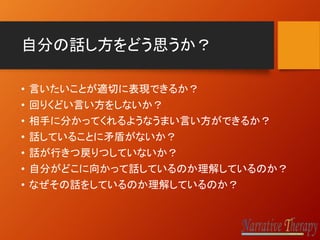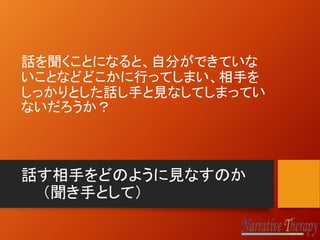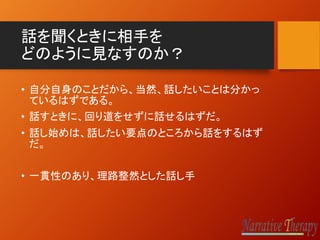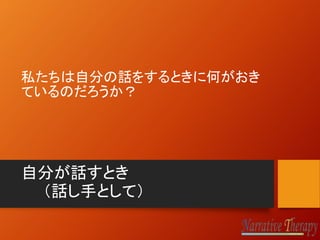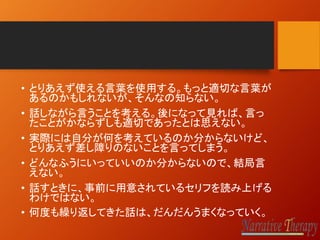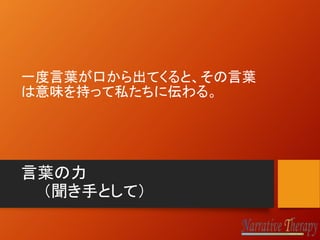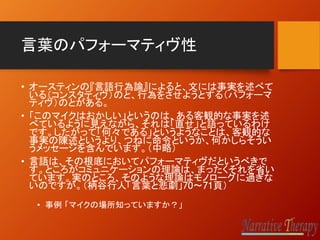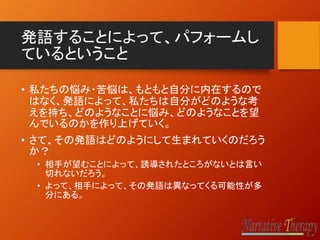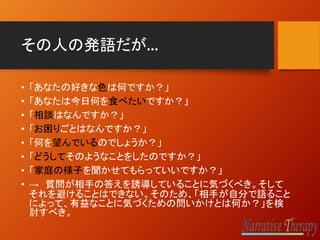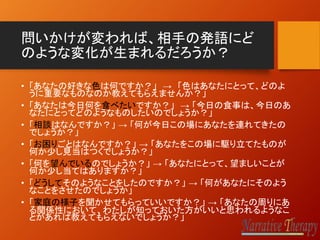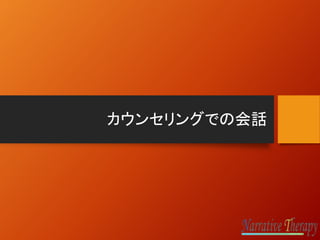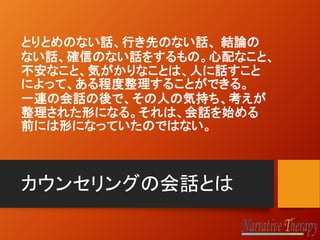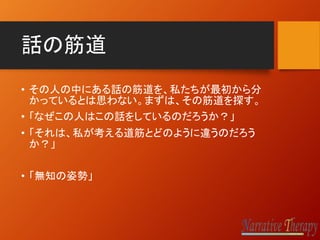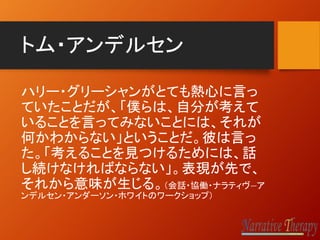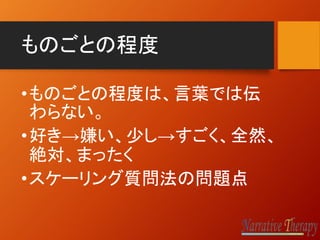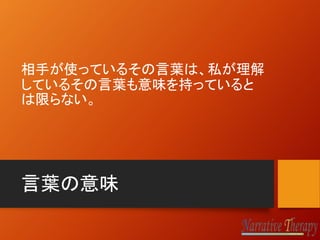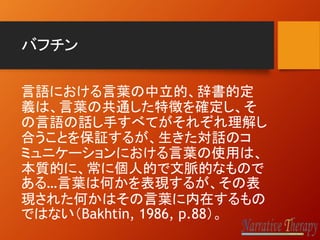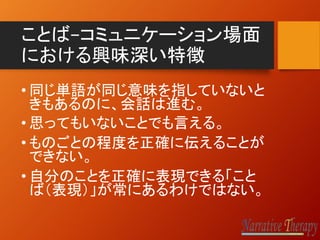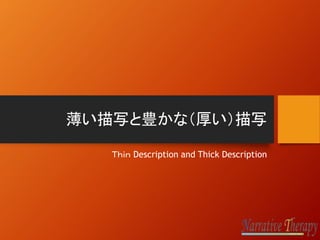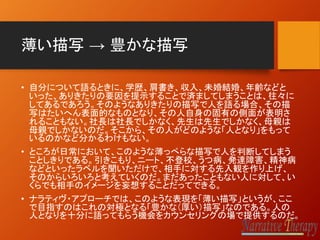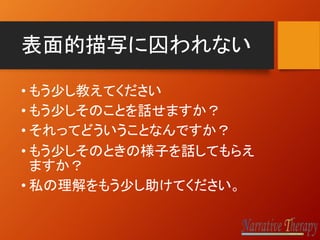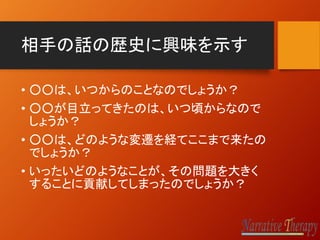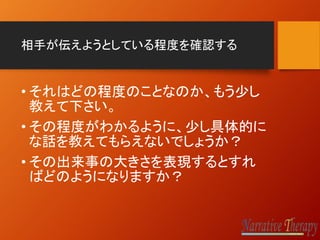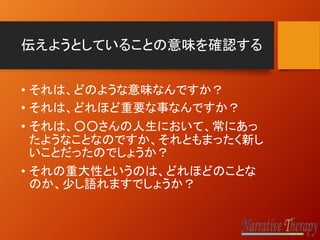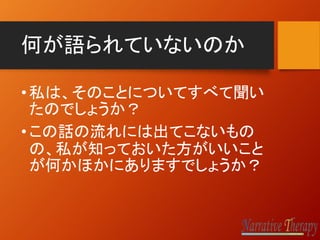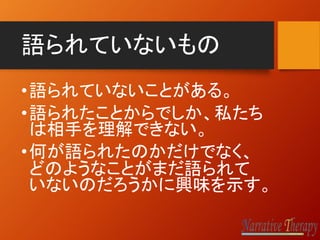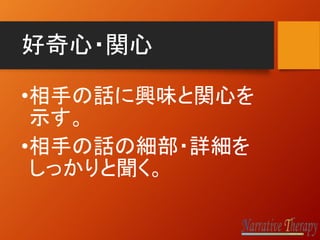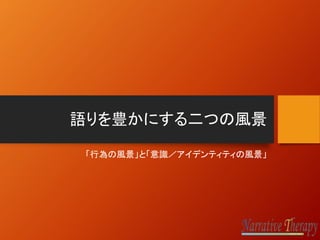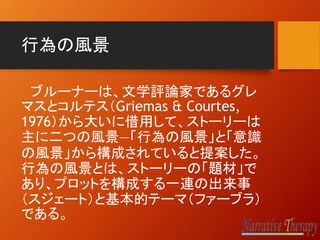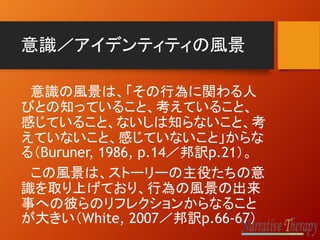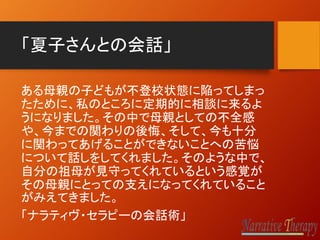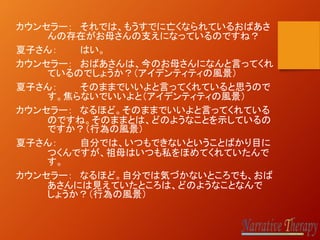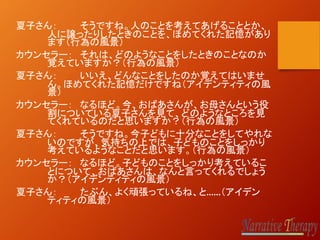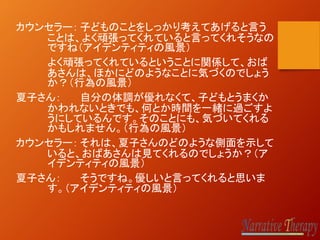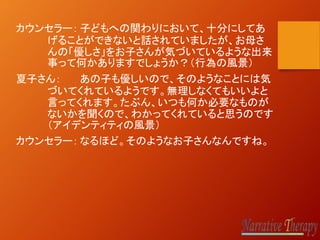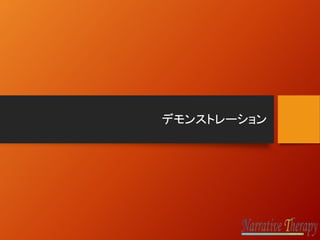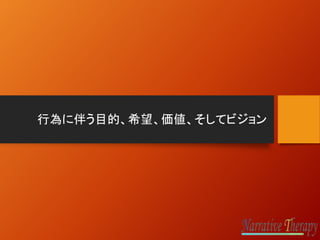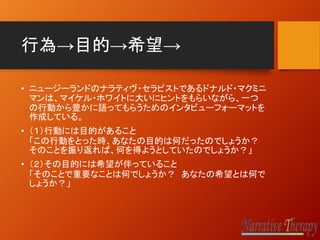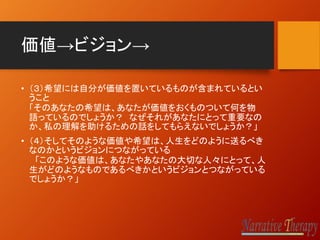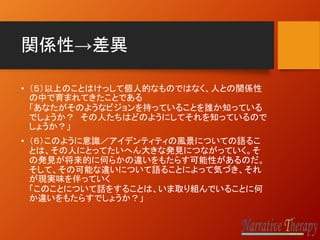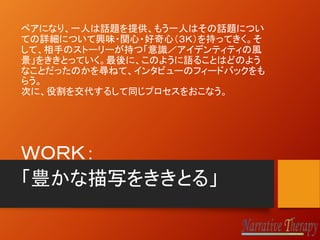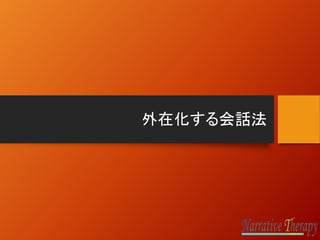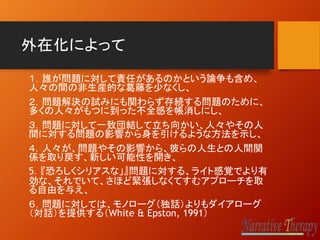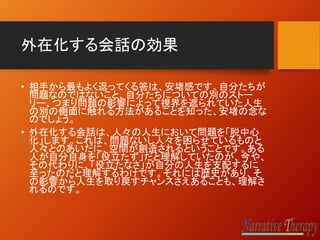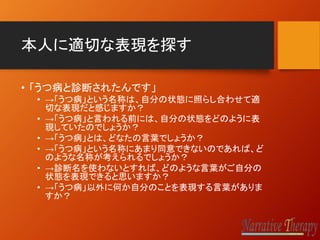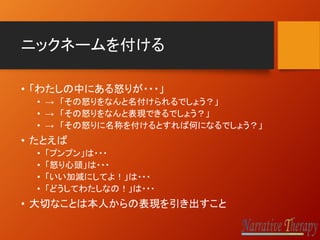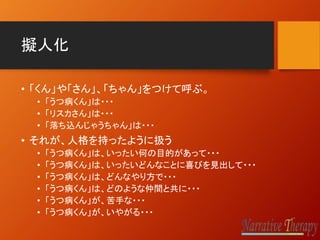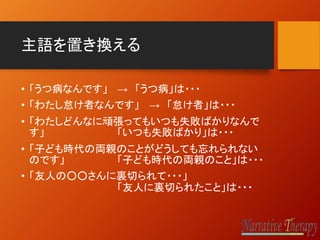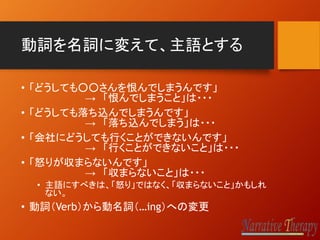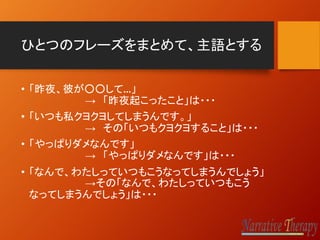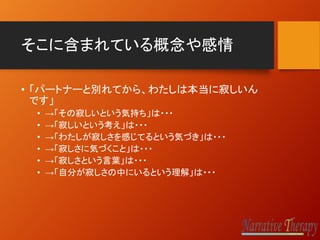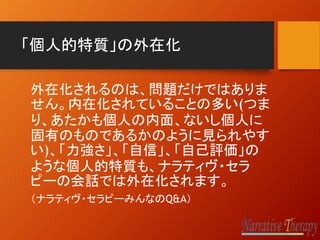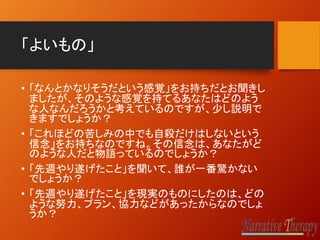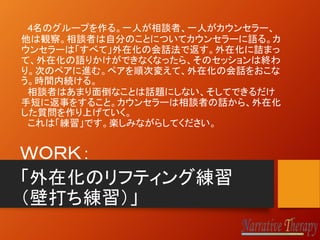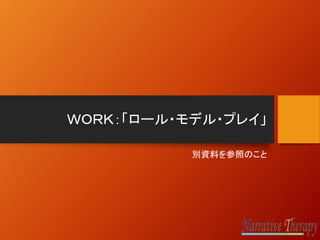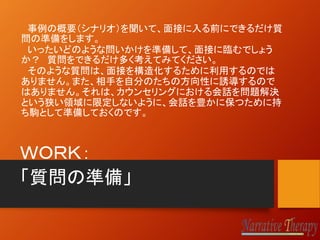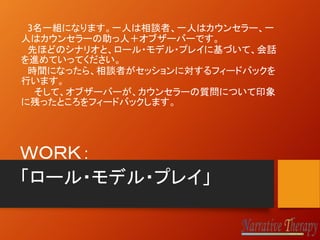闯滨颁顿主催?「ふた?ん使いのナラティウ??セラヒ?ー」(大阪)12月9日10日
- 1. WORKSHOP: ふだん使いの ナラティヴ?セラピー 国重浩一 2017年12月9日(土)?10日(日) 関西生産性本部 A会議室 主催: 日本キャリア開発研究センター(JICD) 後援: 日本?精神技术研究所
- 3. コンフィデンス(Confidence) & 自信 ? 同じ意味であるとされる英語と日本語の言葉がある。とこ ろが、両者が意味することは必ずしも同じであるとは限ら ない。 ? 日本の「自信」 ? 何かを成し遂げることによって、身に付けるもの ? つまり事後的もの ? ニュージーランドの「コンフィデンス(Confidence)」 ? 何かをスタートさせるために、必要なもの ? つまり先立ってあるもの ? 「何もやり遂げたこともないのに、口ばかり達者で???」
- 4. 日本とNZの学校の違い ? 儀式の違い ? 整列 ? 「先生の日」とは ? 高校の試験と期間 ? 大学の入学について ? 授業の選択について ? 大学の授業料とそのローン
- 5. 多民族国家 ? ダイバシティ?カウンセリング?ニュージーランド ? 移民枠の話(移民前のこと VS 移民後のこと) ? 言語のバラツキ ? 人の目、みんな一緒という要求 ? キョロキョロする度合い
- 8. ありがちな会話 ? 相手が途中で早合点してしまう。(会話における「遅 れ」 スティーヴ?ド?シェイザー 「自分の意味が先行 する」) ? 話を最後まで聞いてくれない。 ? 分かってもらっている気がしない。 ? 自分の言いたいことを言わせてもらえない。 ? 自分の言いたくないことを言わされる。 ? 下手なアドバイスをもらって終わる。 ? 相手が話したいことに話題が変わる。
- 10. 自分の話し方をどう思うか? ? 言いたいことが適切に表現できるか? ? 回りくどい言い方をしないか? ? 相手に分かってくれるようなうまい言い方ができるか? ? 話していることに矛盾がないか? ? 話が行きつ戻りつしていないか? ? 自分がどこに向かって話しているのか理解しているのか? ? なぜその話をしているのか理解しているのか?
- 12. 話を聞くときに相手を どのように見なすのか? ? 自分自身のことだから、当然、話したいことは分かっ ているはずである。 ? 話すときに、回り道をせずに話せるはずだ。 ? 話し始めは、話したい要点のところから話をするはず だ。 ? 一貫性のあり、理路整然とした話し手
- 14. ? とりあえず使える言葉を使用する。もっと適切な言葉が あるのかもしれないが、そんなの知らない。 ? 話しながら言うことを考える。後になって見れば、言っ たことがかならずしも適切であったとは思えない。 ? 実際には自分が何を考えているのか分からないけど、 とりあえず差し障りのないことを言ってしまう。 ? どんなふうにいっていいのか分からないので、結局言 えない。 ? 話すときに、事前に用意されているセリフを読み上げる わけではない。 ? 何度も繰り返してきた話は、だんだんうまくなっていく。
- 16. 言葉のパフォーマティヴ性 ? オースティンの『言語行為論』によると、文には事実を述べて いる(コンスタティヴ)のと、行為をさせようとする(パフォーマ ティヴ)のとがある。 ? 「このマイクはおかしい」というのは、ある客観的な事実を述 べているように見えながら、それは「直せ」と語っているわけ です。したがって「何々である」というようなことは、客観的な 事実の陳述というより、つねに命令というか、何かしらそうい うメッセージを含んでいます。(中略) ? 言語は、その根底においてパフォーマティヴだというべきで す。ところがコミュニケーションの理論は、まったくそれを省い ています。実のところ、そのような理論はモノローグに過ぎな いのですが。(柄谷行人「言葉と悲劇」70~71頁) ? 事例 「マイクの場所知っていますか?」
- 17. 発語することによって、パフォームし ているということ ? 私たちの悩み?苦悩は、もともと自分に内在するので はなく、発語によって、私たちは自分がどのような考 えを持ち、どのようなことに悩み、どのようなことを望 んでいるのかを作り上げていく。 ? さて、その発語はどのようにして生まれていくのだろう か? ? 相手が望むことによって、誘導されたところがないとは言い 切れないだろう。 ? よって、相手によって、その発語は異なってくる可能性が多 分にある。
- 18. その人の発語だが… ? 「あなたの好きな色は何ですか?」 ? 「あなたは今日何を食べたいですか?」 ? 「相談はなんですか?」 ? 「お困りごとはなんですか?」 ? 「何を望んでいるのでしょうか?」 ? 「どうしてそのようなことをしたのですか?」 ? 「家庭の様子を聞かせてもらっていいですか?」 ? → 質問が相手の答えを誘導していることに気づくべき。そして それを避けることはできない。そのため、「相手が自分で語ること によって、有益なことに気づくための問いかけとは何か?」を検 討すべき。
- 19. 問いかけが変われば、相手の発語にど のような変化が生まれるだろうか? ? 「あなたの好きな色は何ですか?」 → 「色はあなたにとって、どのよ うに重要なものなのか教えてもらえませんか?」 ? 「あなたは今日何を食べたいですか?」 → 「今日の食事は、今日のあ なたにとってどのようなものしたいのでしょうか?」 ? 「相談はなんですか?」 → 「何が今日この場にあなたを連れてきたの でしょうか?」 ? 「お困りごとはなんですか?」 → 「あなたをこの場に駆り立てたものが 何か少し見当はつくでしょうか?」 ? 「何を望んでいるのでしょうか?」 → 「あなたにとって、望ましいことが 何か少し当てはありますか?」 ? 「どうしてそのようなことをしたのですか?」 → 「何があなたにそのよう なことをさせたのでしょうか」 ? 「家庭の様子を聞かせてもらっていいですか?」 → 「あなたの周りにあ る関係性において、わたしが知っておいた方がいいと思われるようなこ とがあれば教えてもらえないでしょうか?」
- 20. カウンセリングでの会话
- 22. 話の筋道 ? その人の中にある話の筋道を、私たちが最初から分 かっているとは思わない。まずは、その筋道を探す。 ? 「なぜこの人はこの話をしているのだろうか?」 ? 「それは、私が考える道筋とどのように違うのだろう か?」 ? 「無知の姿勢」
- 27. ことば?コミュニケーション場面 における興味深い特徴 ? 同じ単語が同じ意味を指していないと きもあるのに、会話は進む。 ? 思ってもいないことでも言える。 ? ものごとの程度を正確に伝えることが できない。 ? 自分のことを正確に表現できる「こと ば(表現)」が常にあるわけではない。
- 28. 薄い描写と豊かな(厚い)描写 Thin Description and Thick Description
- 29. 薄い描写 → 豊かな描写 ? 自分について語るときに、学歴、肩書き、収入、未婚結婚、年齢などと いった、ありきたりの要因を提示することで済ましてしまうことは、往々に してあるであろう。そのようなありきたりの描写で人を語る場合、その描 写はたいへん表面的なものとなり、その人自身の固有の側面が表明さ れることもない。社長は社長でしかなく、先生は先生でしかなく、母親は 母親でしかないのだ。そこから、その人がどのような「人となり」をもって いるのかなど分かるわけもない。 ? ところが日常において、このような薄っぺらな描写で人を判断してしまう ことしきりである。引きこもり、ニート、不登校、うつ病、発達障害、精神病 などといったラベルを聞いただけで、相手に対する先入観を作り上げ、 そのからいろいろと考えていくのだ。まだあったこともない人に対して、い くらでも相手のイメージを妄想することだってできる。 ? ナラティヴ?アプローチでは、このような表現を「薄い描写」というが、ここ で目指すのはこれの対極となる「豊かな(厚い)描写」なのである。人の 人となりを十分に語ってもらう機会をカウンセリングの場で提供するのだ。
- 30. 表面的描写に囚われない ? もう少し教えてください ? もう少しそのことを話せますか? ? それってどういうことなんですか? ? もう少しそのときの様子を話してもらえ ますか? ? 私の理解をもう少し助けてください。
- 31. 相手の話の歴史に興味を示す ? ○○は、いつからのことなのでしょうか? ? ○○が目立ってきたのは、いつ頃からなので しょうか? ? ○○は、どのような変遷を経てここまで来たの でしょうか? ? いったいどのようなことが、その問題を大きく することに貢献してしまったのでしょうか?
- 32. 相手が伝えようとしている程度を確認する ? それはどの程度のことなのか、もう少し 教えて下さい。 ? その程度がわかるように、少し具体的に な話を教えてもらえないでしょうか? ? その出来事の大きさを表現するとすれ ばどのようになりますか?
- 33. 伝えようとしていることの意味を確認する ? それは、どのような意味なんですか? ? それは、どれほど重要な事なんですか? ? それは、○○さんの人生において、常にあっ たようなことなのですか、それともまったく新し いことだったのでしょうか? ? それの重大性というのは、どれほどのことな のか、少し語れますでしょうか?
- 35. 語られていないもの ?語られていないことがある。 ?語られたことからでしか、私たち は相手を理解できない。 ?何が語られたのかだけでなく、 どのようなことがまだ語られて いないのだろうかに興味を示す。
- 41. カウンセラー: それでは、もうすでに亡くなられているおばあさ んの存在がお母さんの支えになっているのですね? 夏子さん: はい。 カウンセラー: おばあさんは、今のお母さんになんと言ってくれ ているのでしょうか?(アイデンティティの風景) 夏子さん: そのままでいいよと言ってくれていると思うので す。焦らないでいいよと(アイデンティティの風景) カウンセラー: なるほど。そのままでいいよと言ってくれている のですね。そのままとは、どのようなことを示しているの ですか?(行為の風景) 夏子さん: 自分では、いつもできないということばかり目に つくんですが、祖母はいつも私をほめてくれていたんで す。 カウンセラー: なるほど。自分では気づかないところでも、おば あさんには見えていたところは、どのようなことなんで しょうか?(行為の風景)
- 42. 夏子さん: そうですね。人のことを考えてあげることとか、 人に譲ったりしたときのことを、ほめてくれた記憶があり ます(行為の風景) カウンセラー: それは、どのようなことをしたときのことなのか 覚えていますか?(行為の風景) 夏子さん: いいえ、どんなことをしたのか覚えてはいませ ん。ほめてくれた記憶だけですね(アイデンティティの風 景) カウンセラー: なるほど。今、おばあさんが、お母さんという役 割についている夏子さんを見て、どのようなところを見 てくれているのだと思いますか?(行為の風景) 夏子さん: そうですね。今子どもに十分なことをしてやれな いのですが、気持ちの上では、子どものことをしっかり 考えているようなことだと思います。(行為の風景) カウンセラー: なるほど。子どものことをしっかり考えているこ とについて、おばあさんは、なんと言ってくれるでしょう か?(アイデンティティの風景) 夏子さん: たぶん、よく頑張っているね、と……(アイデン ティティの風景)
- 43. カウンセラー: 子どものことをしっかり考えてあげると言う ことは、よく頑張ってくれていると言ってくれそうなの ですね(アイデンティティの風景) よく頑張ってくれているということに関係して、おば あさんは、ほかにどのようなことに気づくのでしょう か?(行為の風景) 夏子さん: 自分の体調が優れなくて、子どもとうまくか かわれないときでも、何とか時間を一緒に過ごすよ うにしているんです。そのことにも、気づいてくれる かもしれません。(行為の風景) カウンセラー: それは、夏子さんのどのような側面を示して いると、おばあさんは見てくれるのでしょうか?(ア イデンティティの風景) 夏子さん: そうですね。優しいと言ってくれると思いま す。(アイデンティティの風景)
- 44. カウンセラー: 子どもへの関わりにおいて、十分にしてあ げることができないと話されていましたが、お母さ んの「優しさ」をお子さんが気づいているような出来 事って何かありますでしょうか?(行為の風景) 夏子さん: あの子も優しいので、そのようなことには気 づいてくれているようです。無理しなくてもいいよと 言ってくれます。たぶん、いつも何か必要なものが ないかを聞くので、わかってくれていると思うのです (アイデンティティの風景) カウンセラー: なるほど。そのようなお子さんなんですね。
- 45. デモンストレーション
- 47. 行為→目的→希望→ ? ニュージーランドのナラティヴ?セラピストであるドナルド?マクミニ マンは、マイケル?ホワイトに大いにヒントをもらいながら、一つ の行動から豊かに語ってもらうためのインタビューフォーマットを 作成している。 ? (1)行動には目的があること 「この行動をとった時、あなたの目的は何だったのでしょうか? そのことを振り返れば、何を得ようとしていたのでしょうか?」 ? (2)その目的には希望が伴っていること 「そのことで重要なことは何でしょうか? あなたの希望とは何で しょうか?」
- 48. 価値→ビジョン→ ? (3)希望には自分が価値を置いているものが含まれているとい うこと 「そのあなたの希望は、あなたが価値をおくものついて何を物 語っているのでしょうか? なぜそれがあなたにとって重要なの か、私の理解を助けるための話をしてもらえないでしょうか?」 ? (4)そしてそのような価値や希望は、人生をどのように送るべき なのかというビジョンにつながっている 「このような価値は、あなたやあなたの大切な人々にとって、人 生がどのようなものであるべきかというビジョンとつながっている でしょうか?」
- 49. 関係性→差異 ? (5)以上のことはけっして個人的なものではなく、人との関係性 の中で育まれてきたことである 「あなたがそのようなビジョンを持っていることを誰か知っている でしょうか? その人たちはどのようにしてそれを知っているので しょうか?」 ? (6)このように意識/アイデンティティの風景についての語るこ とは、その人にとってたいへん大きな発見につながっていく。そ の発見が将来的に何らかの違いをもたらす可能性があるのだ。 そして、その可能な違いについて語ることによって気づき、それ が現実味を伴っていく 「このことについて話をすることは、いま取り組んでいることに何 か違いをもたらすでしょうか?」
- 51. WORKSHOP: Day 2
- 52. 外在化する会话法
- 56. 本人に適切な表現を探す ? 「うつ病と診断されたんです」 ? →「うつ病」という名称は、自分の状態に照らし合わせて適 切な表現だと感じますか? ? →「うつ病」と言われる前には、自分の状態をどのように表 現していたのでしょうか? ? →「うつ病」とは、どなたの言葉でしょうか? ? →「うつ病」という名称にあまり同意できないのであれば、ど のような名称が考えられるでしょうか? ? →診断名を使わないとすれば、どのような言葉がご自分の 状態を表現できると思いますか? ? →「うつ病」以外に何か自分のことを表現する言葉がありま すか?
- 57. ニックネームを付ける ? 「わたしの中にある怒りが???」 ? → 「その怒りをなんと名付けられるでしょう?」 ? → 「その怒りをなんと表現できるでしょう?」 ? → 「その怒りに名称を付けるとすれば何になるでしょう?」 ? たとえば ? 「プンプン」は??? ? 「怒り心頭」は??? ? 「いい加減にしてよ!」は??? ? 「どうしてわたしなの!」は??? ? 大切なことは本人からの表現を引き出すこと
- 58. 擬人化 ? 「くん」や「さん」、「ちゃん」をつけて呼ぶ。 ? 「うつ病くん」は??? ? 「リスカさん」は??? ? 「落ち込んじゃうちゃん」は??? ? それが、人格を持ったように扱う ? 「うつ病くん」は、いったい何の目的があって??? ? 「うつ病くん」は、いったいどんなことに喜びを見出して??? ? 「うつ病くん」は、どんなやり方で??? ? 「うつ病くん」は、どのような仲間と共に??? ? 「うつ病くん」が、苦手な??? ? 「うつ病くん」が、いやがる???
- 59. 主語を置き換える ? 「うつ病なんです」 → 「うつ病」は??? ? 「わたし怠け者なんです」 → 「怠け者」は??? ? 「わたしどんなに頑張ってもいつも失敗ばかりなんで す」 「いつも失敗ばかり」は??? ? 「子ども時代の両親のことがどうしても忘れられない のです」 「子ども時代の両親のこと」は??? ? 「友人の○○さんに裏切られて???」 「友人に裏切られたこと」は???
- 60. 動詞を名詞に変えて、主語とする ? 「どうしても○○さんを恨んでしまうんです」 → 「恨んでしまうこと」は??? ? 「どうしても落ち込んでしまうんです」 → 「落ち込んでしまう」は??? ? 「会社にどうしても行くことができないんです」 → 「行くことができないこと」は??? ? 「怒りが収まらないんです」 → 「収まらないこと」は??? ? 主語にすべきは、「怒り」ではなく、「収まらないこと」かもしれ ない。 ? 動詞(Verb)から動名詞(…ing)への変更
- 61. ひとつのフレーズをまとめて、主語とする ? 「昨夜、彼が○○して…」 → 「昨夜起こったこと」は??? ? 「いつも私クヨクヨしてしまうんです。」 → その「いつもクヨクヨすること」は??? ? 「やっぱりダメなんです」 → 「やっぱりダメなんです」は??? ? 「なんで、わたしっていつもこうなってしまうんでしょう」 →その「なんで、わたしっていつもこう なってしまうんでしょう」は???
- 62. そこに含まれている概念や感情 ? 「パートナーと別れてから、わたしは本当に寂しいん です」 ? →「その寂しいという気持ち」は??? ? →「寂しいという考え」は??? ? →「わたしが寂しさを感じてるという気づき」は??? ? →「寂しさに気づくこと」は??? ? →「寂しさという言葉」は??? ? →「自分が寂しさの中にいるという理解」は???
- 64. 「よいもの」 ? 「なんとかなりそうだという感覚」をお持ちだとお聞きし ましたが、そのような感覚を持てるあなたはどのよう な人なんだろうかと考えているのですが、少し説明で きますでしょうか? ? 「これほどの苦しみの中でも自殺だけはしないという 信念」をお持ちなのですね。その信念は、あなたがど のような人だと物語っているのでしょうか? ? 「先週やり遂げたこと」を聞いて、誰が一番驚かない でしょうか? ? 「先週やり遂げたこと」を現実のものにしたのは、どの ような努力、プラン、協力などがあったからなのでしょ うか?
- 67. シナリオ

